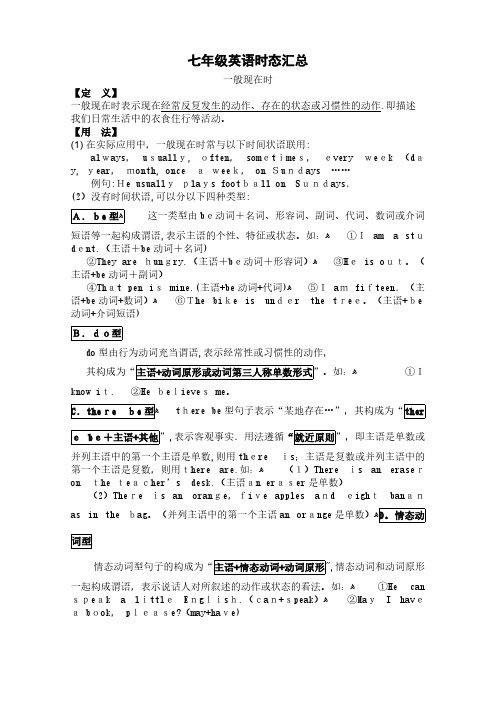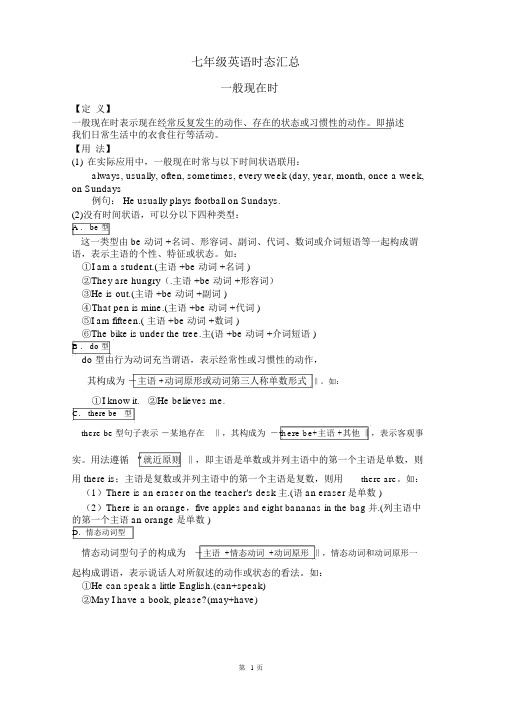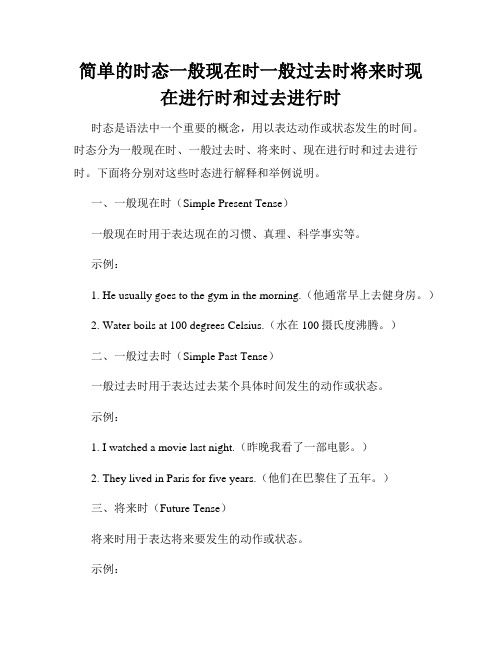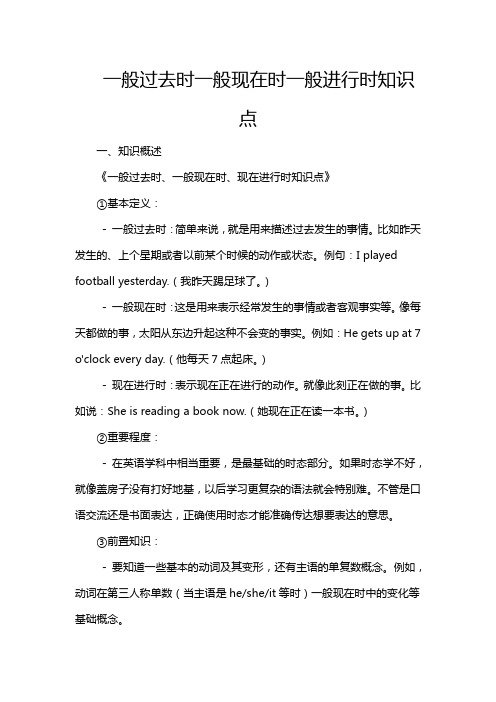一般现在时态一般过去时,现在进行时,讲练
时态混合:一般现在、一般过去和一般将来时、现在进行时(教师版)

知识图谱一般现在时知识精讲一、一般现在时表示通常性、规律性、习惯性、真理性的状态或者动作有时间规律发生的事件的一种时间状态。
二、句子结构主语(第一/二人称/第三人称复数)+do (动词原形)主语(第三人称单数)+does (动词三单形式)主语+am/ is /are用法示例表示经常性或习惯性的动作We get up at six every morning.我们每天早上六点钟起床。
表示现在的状态、能力、性格Mr. Wang writes good English but he doesn’t speak well.王先生的英文写得很好但他说不好。
表示格言或警句Pride goes before a fall.骄者必败。
表示永恒的客观真理The earth moves around the sun.地球绕着太阳转。
四、时间状语1. 表示频率的副词: always, usually, often, sometimes, never, hardly, seldom…2. every/once+名词: every day/ week/ year, once a week/ month …3. 表示时间的短语: twice a day, on weekends, on Mondays…情况变形示例一般情况加-s help-helps play-plays以辅音字母+o结尾加-es go-goes do-does以x, sh, ch, s结尾加-es teach-teaches brush-brushes以辅音字母+y结尾变y为i加es study-studies try-tries特殊情况没有统一的规则have-has; be-isbe动词行为动词用法我是am你是are;is跟着他/她/它;复数都用are。
主语是第三人称单数外,都用动词原形;主语是第三人称单数时,动词词尾加-s或-es。
肯定式I am a student.我是一名学生。
一般现在时现在进行时一般过去时讲解

一般过去时态1基本用法1.一般过去时通常用来表示过去发生的动作或存在的状况;如:--- Where were you last week上周你在哪儿--- I was at my uncle's home in the countryside.上周我在乡下的叔叔家;2.有些情况,发生时间没有明确标明,但实际上是过去发生的,应用过去时态;另外,在谈到已故去的人时,也多用过去时;如:He bought a cat, and now they are good friends.他买了一只猫,现在他们是好朋友了;Lu Xun was a great writer.鲁迅是一位伟大的作家;2时间状语与一般过去时连用的时间状语有:yesterday昨天, last night昨晚, last week上个星期, four days ago四天前, in 2002在2002年, just now刚才, the day before yesterday前天等;如:He went to the park yesterday.她昨天去了花园;I was ten years old in 2001.我2001年才10岁;3动词的过去式在一般过去时态中会涉及到动词的过去式,大家要掌握规则动词的过去式的变化规则;其基本的变化规则如下:①一般情况下,在动词原形后直接ed;如:play –played , look –looked;②以e结尾的动词在其后加d;如:like –liked, use –used;③与辅音字母加y结尾的动词,把y变成i再加ed;如:carry –carried, marry - married;④以重读闭音节或r音节结尾,末尾只有一个辅音字母时,双写这个辅音字母,再加ed;如:stop –stopped, prefer –preferred;当然,刚才提到的都是规则动词的构成,我们还学过许多不规则动词的过去式形式;如:am –was,are –were, put –put, see –saw, eat –ate等,这些可需要我们在课下牢牢记住哟一般现在时态一、定义与讲解一般现在时:表示经常性的事情,经常性的动作或一般性事实;二、一般现在时的用法表示经常性或习惯性的动作或存在的状态;表示客观事实或普遍真理;在时间、条件等状语从句中,用现在时表示将来;在某些以here,there开头的句子中,用一般现在时表示正在发生的动作三、时间状语:often 经常,usually通常,always 总是,every每个,sometimes 有时,at …在几点钟只有在第三人称单数用动词的“三单变化”,其他用动词的原形;动词三单变化规则:1.多数在动词后+s play —plays like —likes1直接在动词词尾加-s.ask---asks work---works get---gets stay---stays2以字母s, x, ch, sh或o结尾的动词,在词尾直接加-es.watch---watches wish---wishes fix---fixes do---doesgo---goes pass---passes3以“辅音字母加- y”结尾的动词,要先变y为i再加-es.try---tries study---studies cry---cries fly---flies四、一般现在时的结构一、概念、现在进行时表说话时正在进行或发生的动作,也可表示当前一段时间内的活动或现阶段正在进行的动作.结构:助动词be am / is / are +现在分词.二、现在分词的构成:1.大多数动词后可在动词后直接加-ing.Eg: carry-carrying,catch-catching,drink-drinking, enjoy-enjoying hurry-hurrying ,do-doing , r ead-reading , think-thinking2.如果动词以-e结尾,则去掉-e,再加-ing,如come-coming , have-having , make-making,ride-riding,write-writing,take-taking,use-using.3. 如果动词只有一个元音字母,而其后跟有一个辅音字母时,将此辅音字母双写,再加-ing如:hit-hitting,let-letting, put-putting,run-running,sit-sitting.4. 如果动词有两个音节,且重音在第二个音节上,则末尾的辅音字母须双写,再加-ing,如: for’get-forgetting, pre’fer-preferring,up’set-upsetting.试比较’benefit/benfi ting, ’differ/differing,’profit/profiting,这些词的重音在第一个音节上,因此其末尾的辅音字母不双写.5. 以-ic 结尾的动词,应先把-ic 变为-ick,再加-ing, eg: panic/panicking,picnic/picnicking,但lie/lying ,die/dying,tie/tying是特殊变化要记住.三、句型结构:1.现在进行时的肯定形式、否定形式、疑问形式及其回答,所有变化都体现在助动词be is / am / are 上.1现在进行时的肯定形式:主语+beam/ is/are+doing+其他成分I am singing . They are writing .2现在进行时的否定形式:主语+beam/ is/are+not +doing+其他成分I am not singing . They aren’t writing .3一般疑问句及回答:beam/ is/are+ 主语+doing+其他成分Am I singing Yes ,you are . / No ,you aren’t .Are they writing Yes ,they are . / No ,they aren’t .4特殊疑问句及回答:特殊疑问词+beam/ is/are+主语+doing+其他成分What are you doing We are playing 要求就提问内容具体回答.3.说明: 不是所有动词都能用现在进行时态的,如:see、like、want、know 等动词往往都不用进行时态.四.用法:1.表示现在指说话人说话时正在发生的事情.往往与now,at the moment,just 等副词连用,以示强调.We are waiting for you What are you doingSome one’s knocking at the door.2.正在进行着的动作可视为未完成的动作;He’s talking to his friends in the classroom. 可用still 一词强调动作的持续性He’s still talking to his friends in the classroom.3. 表示长期的或重复性的动作,说话时动作未必正在进行.Mr. Black is writing another article. Don’t take that book away. Your father’s using it. She is learning piano under Mr. Black.4.现在进行时可用来表示不会长期发生的动作或情况,或被认为在短期内正在进行的动作或存在的情况:What’s your brother doing these days He’s studying English at Oxford University.5.现在进行时也可以用来表示当前的动向:People are becoming more and more beautiful these days.6. 表示渐变的动词有:become,turn,get,grow,run,go,begin等.The leaves are turning brow. It’s getting colder and colder. 7.与always,constantly,forever 等词连用,表反复发生的动作或持续存在的状态,往往带有说话人的主观色彩.You are always changing your mind.8. 现在进行时以及be going to可以表示为将来安排好的活动和事件We’re spending ne xt winter in China. 用arrive,come,go,leave 等动词的现在进行时描写行程安排,也通常有“将到达”和“将离去”的意思:He’s arriving tomorrow morning.9.当现在进行时表示某事发生的次数过多时,则有时含有抱怨,讨厌,赞扬等的意思:He is always singing at night,and we can’t fall asleep late at night.一、写出下列动词的过去式:二、2. enjoy_________ 5. have______三、am_____ 8. want_______ 9. talk_______四、12. take________ 13. do______ 14. get_____ 15. catch_______五、二、用所给动词正确形式填空;六、1. My mother ________buy a lot of postcards yesterday.七、2. The twins_________be thirteen years old two years ago.八、3. I ______ get up at half past six this morning.九、4. Jim _______help an old man carry his bag just now.十、5. There ______be a King many years ago.十一、6. Did you ______have a test yesterday 7. I ________come to school at seven yesterday. 8. Once he _________be a shop assistant.9. The bat _______like sleeping in the day and ______ fly out for food at night.does Mr. Lin_______live ---He _______live in the USA.11. Mother always ______do some washing after meals.twins _________ wear a pair of glasses every day.13. A plane always _______fly high in the sky.usually __________get up early in the morning.15. The two writers __________visit each other once a year.________play football every day.三、选择填空;1. My parents were having supper when I _____ back home.A. comeB. cameC. comingD. comes2. My sister ____ the Youth League last year.A. joinB. joinsC. joinedD. joining3. Father ______ his coat and went out.A. put onB. puts onC. putted onD. puted on4. The teacher _____ me a question just now.A. askB. askedC. askingD. asks5. This is my ninth birthday and I _____ eight years old last year.A. wasB. wereC. isD. are6. Did you ______ a letter to me last monthA. writeB. writesC. writingD. wrote7. Mother ______ a story about a hungry wolf yesterday.A. tellB. toldC. tellsD. telling8. --- What did he do last week--- He _______ his grandparents.A. visitsB. visitedC. is visitingD. visit9. She picked up the apples and ______ it back to the old man.A. giveB. givesC. gaveD. is gaving10. I ______ to the teacher, but I didn’t ______ her.A. listen, heardB. listened, heardC. listened, hearD. listen, hear四、句型转换:1. They visit us every day.用yesterday 替换every day改写They ________ ________ yesterday.2. He arrives late every day. 用last Monday 替换every day改写He __________ _____ ______ ________.3. I had an English class last Friday.改为_______ you _______ an English class last Friday4. It rained hard last night.改为_______________________________________________5. They played volley-ball yesterday afternoon.对划线提问___________________________________________________。
(完整版)小学一般现在时-过去式-现在进行时-将来时讲解

四种时态的比较.不规则动词过去式:原形过去式原形过去式原形过去式原形过去式sweep swept teach taught have had go went keep kept think thought do did find found sleep slept buy bought eat ate say said feel felt drink drank is/am was take took read read give gave are were mean meantput put sing sang drive drove meet met cut cut begin began speak spoke make made let let ring rang write wrote see saw fly flew run ran ride rode come came draw drew sit sat hear heard tell toldgrow grew learn learned/learntget got know knew一、用动词的适当形式填空1. My parents _______ (come) from Shandong.2. Sam _______(not like) playing computer games.3. The beautiful girl _______(wear) glasses.4. The Zhang family _______(live) in a flat in Nanjing.5. My father likes _______(read) newspapers after work.6. What _______her classmates _______(call) her teacher?7. _______ you _______(love) each other in your family?8. _______(be) your cousin very clever at maths?9. She is good at dancing. She ________ (sing) very well, too.11. Amy ________(take) her dog for a walk every afternoon.12. Mr. Li ________(not teach) us maths this term. (学期)13. Mr. Chen ________(not like) tea. He ________(enjoy) drinking coffee.14. ________ your father often ________(play) tennis ?No, he loves ________(read) newspapers.15. Everyone in our class ________(like) P.E. a lot.16. Who else ________(want) to come to Millie’s party? I ________.17. Many of them ________(work) hard at their lessons. They _____ (be) cl ever at them.18. What _______ Mary _______(have) for breakfast ?She _______(have) an egg and a glass of milk.19. Our school ________(be) a big nice school. And our teacher ______(be ) a good teacher.20. Simon and Daniel ________(be) American.二、句型转换。
时态综合练习(一般现在时现在进行时一般将来时一般过去时)

一、用动词的正确形式填空1.My mother____is cleaning____(clean)our room just now.2.She____likes_____(like)swimming.She___swam______(swim)last weekend.3.The plane___is flying_____(fly)over the building now.4.Listen!My aunt____is singing____(sing)in the room.She is a singer.She__likes____(like)singing.5.What___do____you usually__do____(do)this evening?I__play____(play)computer games.6.What__did_she__do__(do)yesterday?She__visited_(visit)her grandparents.7.___Will____people___have___(have)robots in the future?Yes,they__will__.8.- __Does__Tom often __watch__(watch)TV on Saturday?- Yes,he___does____.9.Li Fang___is___(be)good at math.18.My sister_____doesn’t____like__(not like)swimming.10. The three of them were in a hurry because their plane ___were leaving__ (leave) in five minutes.11.They ___will build____(build)a new bridge over the river next year.12.My father __was doing____ some washing when I got home yesterday evening. (do)13.She__put___on her coat and went out.(put)14.She__was making__(make)her dress the whole afternoon.15.He___didn’t do___(not do)his homework last night.16.Grandma ____was cooking___ breakfast while I was doing my homework this morning. (cook)17.The scientist___gave____(give)us a talk yesterday.二、选择题1.Jim usually_____D_____up at five.A.getB.gotC.is gettingD.gets2.He usually___B______TV on Sunday evening.A.watchB.watchesC.watchingD.is watching3.The famous writer__B__one new book in the past two years.A.is writingB.was writingC.wroteD.has written4.Mike_____B_______TV twice a week(一周两次).A.watchB.watchesC.watchedD.has watched5.They____B______a basketball match next Sunday.A.watchB.will watchC.watchedD.are watching6.The Greens________C_________back in a week.A.isB.areC.will beD.was7.Listen!Some of the girls___A_____about Harry Potter.Let’s join them.A.are talkingB.talkC.were talkingD.talked8.She will have a holiday as soon as she___A___the work next week.A.finishesB.doesn’t finishC.will finishD.won’t finish9.- Our country___C___a lot so far(到目前为止).- Yes.I hope it will be even______.A.has changed;wellB.changed;goodC.has changed;betterD.changed;better10.There_____B_______a party tonight.A.will haveB.is going to beC.is going to haveD.was going to be11.Tim always__A___a picture at home.He_____a car now.A.draws;is drawingB.draw;drawC.draws;drawD.drawing;drawing12.-Where’s Jim?-He___C___to the shop.He’ll be back in an hour.A.goesB.goC.has goneD.will go13.He has__B___been to Shanghai,has he?A.alreadyB.neverC.everD.still14.Have you met Mr.Li___C___?A.justB.agoC.beforeD.a moment ago15. Our teacher, Miss Chen, ___B____ English on the radio the day before yesterday.A. teachesB. taughtC. will teachD. had taught16.I don’t think I___A____you in that dress before.A.have seenB.seeingC.sawD.see17.Both his parents look sad.Maybe they__B__what's happened to him.A.knewB.have knownC.must knowD.will know18.We_______C______a football match three weeks ago.A.haveB.will haveC.hadD.are having19.Zhao Lan_C__already___in this school for two years.A.was;studyingB.will;studyC.has studiedD.are;studying20.______C______Tom and Jim in the classroom just now?A.WasB.AreC.WereD.Is21.What____B____you_______when I rang you up.A.are;doingB.were;doingC.do;doD.have;done22.When I______B________her in the hall,she was playing the piano.A.seeB.sawC.will seeD.am seeing23.He turned off the lights and then_____D__________the classroom.A.leavesB.will leaveC.is leavingD.left24.-Is your father in?-No,he___B____for three hours.A.was notB.has been outC.went outD.has gone out25.There__D___a sports meeting in two days.A.is going to haveB.are going to beC.will haveD.will be26.Look at those clouds.It_____A________soon.A.is going to rainB.is rainingC.will rainD.won’t rain27.Plenty of foreigners from all over the world____A__China every year.A.visitB.visited C visits D.are visiting28.There____B___a football game this afternoon.A.will haveB.is going to beC.hasD.are going to be。
七年级英语时态汇总一般现在时-一般过去时和现在进行时

七年级英语时态汇总一般现在时【定 义】一般现在时表示现在经常反复发生的动作、存在的状态或习惯性的动作.即描述我们日常生活中的衣食住行等活动。
【用 法】(1)在实际应用中,一般现在时常与以下时间状语联用:always,usually, often,sometimes,every week (day, year,month, once aweek, on Sundays ……例句:He usuallyplays football on Sundays.(2)没有时间状语,可以分以下四种类型:A.be型ﻫ这一类型由be动词+名词、形容词、副词、代词、数词或介词短语等一起构成谓语,表示主语的个性、特征或状态。
如:ﻫ①Iam a student.(主语+be动词+名词)②They are hungry.(主语+be动词+形容词)ﻫ③He is out。
(主语+be动词+副词)④That pen is mine.(主语+be动词+代词)ﻫ⑤I am fifteen.(主语+be动词+数词)ﻫ⑥The bike is under the tree。
(主语+be动词+介词短语)B.do型do型由行为动词充当谓语,表示经常性或习惯性的动作,其构成为“主语+动词原形或动词第三人称单数形式”。
如:ﻫ ①I know it. ②He believes me。
C.there be型ﻫthere be型句子表示“某地存在…”,其构成为“ther ebe+主语+其他”,表示客观事实.用法遵循“就近原则”,即主语是单数或并列主语中的第一个主语是单数,则用there is;主语是复数或并列主语中的第一个主语是复数,则用there are.如:ﻫ (1)There is an eraseron the teacher’s desk.(主语an eraser是单数)(2)There is an orange,five apples and eight bananas in the bag。
七年级英语时态汇总(一般现在时_一般过去时和现在进行时)_1

七年级英语时态汇总一般现在时【定义】一般现在时表示现在经常反复发生的动作、存在的状态或习惯性的动作。
即描述我们日常生活中的衣食住行等活动。
【用法】(1)在实际应用中,一般现在时常与以下时间状语联用:always, usually, often, sometimes, every week (day, year, month, once a week, on Sundays例句: He usually plays football on Sundays.(2)没有时间状语,可以分以下四种类型:A . be 型这一类型由 be 动词 +名词、形容词、副词、代词、数词或介词短语等一起构成谓语,表示主语的个性、特征或状态。
如:①I am a student.(主语 +be 动词 +名词 )②They are hungry(.主语 +be 动词 +形容词)③He is out.(主语 +be 动词 +副词 )④T hat pen is mine.(主语 +be 动词 +代词 )⑤I am fifteen.( 主语 +be 动词 +数词 )⑥The bike is under the tree.主(语 +be 动词 +介词短语 )B . do 型do 型由行为动词充当谓语,表示经常性或习惯性的动作,其构成为―主语 +动词原形或动词第三人称单数形式‖。
如:①I know it. ②He believes me.C. there be型there be型句子表示―某地存在‖,其构成为―there be+主语+其他‖,表示客观事实。
用法遵循“就近原则‖,即主语是单数或并列主语中的第一个主语是单数,则用 there is;主语是复数或并列主语中的第一个主语是复数,则用there are。
如:(1)There is an eraser on the teacher's desk主.(语 an eraser是单数 )(2)There is an orange,five apples and eight bananas in the bag并.(列主语中的第一个主语 an orange是单数 )D.情态动词型情态动词型句子的构成为―主语+情态动词+动词原形‖,情态动词和动词原形一起构成谓语,表示说话人对所叙述的动作或状态的看法。
简单的时态一般现在时一般过去时将来时现在进行时和过去进行时

简单的时态一般现在时一般过去时将来时现在进行时和过去进行时时态是语法中一个重要的概念,用以表达动作或状态发生的时间。
时态分为一般现在时、一般过去时、将来时、现在进行时和过去进行时。
下面将分别对这些时态进行解释和举例说明。
一、一般现在时(Simple Present Tense)一般现在时用于表达现在的习惯、真理、科学事实等。
示例:1. He usually goes to the gym in the morning.(他通常早上去健身房。
)2. Water boils at 100 degrees Celsius.(水在100摄氏度沸腾。
)二、一般过去时(Simple Past Tense)一般过去时用于表达过去某个具体时间发生的动作或状态。
示例:1. I watched a movie last night.(昨晚我看了一部电影。
)2. They lived in Paris for five years.(他们在巴黎住了五年。
)三、将来时(Future Tense)将来时用于表达将来要发生的动作或状态。
示例:1. We will have a meeting tomorrow.(我们明天要开会。
)2. She is going to travel to Japan next month.(她下个月将要去日本旅行。
)四、现在进行时(Present Continuous Tense)现在进行时用于表达正在进行的动作。
示例:1. They are watching TV at the moment.(他们此刻正在看电视。
)2. She is studying for her exam right now.(她正在复习考试。
)五、过去进行时(Past Continuous Tense)过去进行时用于表达过去某一时刻正在进行的动作。
示例:1. I was reading a book when she called.(她给我打电话的时候,我正在看书。
一般过去时一般现在时一般进行时知识点

一般过去时一般现在时一般进行时知识点一、知识概述《一般过去时、一般现在时、现在进行时知识点》①基本定义:- 一般过去时:简单来说,就是用来描述过去发生的事情。
比如昨天发生的、上个星期或者以前某个时候的动作或状态。
例句:I played football yesterday.(我昨天踢足球了。
)- 一般现在时:这是用来表示经常发生的事情或者客观事实等。
像每天都做的事,太阳从东边升起这种不会变的事实。
例如:He gets up at 7 o'clock every day.(他每天7点起床。
)- 现在进行时:表示现在正在进行的动作。
就像此刻正在做的事。
比如说:She is reading a book now.(她现在正在读一本书。
)②重要程度:- 在英语学科中相当重要,是最基础的时态部分。
如果时态学不好,就像盖房子没有打好地基,以后学习更复杂的语法就会特别难。
不管是口语交流还是书面表达,正确使用时态才能准确传达想要表达的意思。
③前置知识:- 要知道一些基本的动词及其变形,还有主语的单复数概念。
例如,动词在第三人称单数(当主语是he/she/it等时)一般现在时中的变化等基础概念。
④应用价值:- 在日常生活中很有用。
当你讲过去做了啥,经常做啥和现在正在做啥的时候,就离不开这几个时态。
比如和朋友聊天,介绍自己的日常习惯(一般现在时)、正在做的事情(现在进行时)或者讲以前的经历(一般过去时)。
二、知识体系①知识图谱:- 在英语语法体系里,时态这块儿它们就像基础的砖块。
一般过去时、一般现在时和现在进行时是初步接触时态学的时候的重点部分,后面再学其他时态,像是过去进行时、现在完成时等都会和这几个时态有联系。
②关联知识:- 与词性、句子结构是有联系的。
比如说动词在不同时态下的变化就和动词的词性有很大关系。
同时在复杂句子结构中要正确选择合适的时态才能保证整个句子表达合理。
③重难点分析:- 掌握难度方面,对初学者来说,可能一般现在时在第三人称单数后面动词的变化比较难记,像go变成goes这种。
- 1、下载文档前请自行甄别文档内容的完整性,平台不提供额外的编辑、内容补充、找答案等附加服务。
- 2、"仅部分预览"的文档,不可在线预览部分如存在完整性等问题,可反馈申请退款(可完整预览的文档不适用该条件!)。
- 3、如文档侵犯您的权益,请联系客服反馈,我们会尽快为您处理(人工客服工作时间:9:00-18:30)。
学习好资料 欢迎下载 一、一般现在时 一般现在时主要用来表示每天、每周等经常一直如此,长期进行下去的动作,其着眼点不在描述具体的动作,而是通过提出不断反复的动作,来说明某一真理或某一经常性习惯性的举动。 一般现在时的几种主要用法: 1.不受时限的客观存在,包括客观真理、格言、科学事实及其他不受时限的事实 The earth moves around the sun. 地球绕太阳转动。 Pride goes before a fall.骄者必败。 例:Columbus proved that the earth is round. 哥伦布证实了地球是圆的。 2)表示现在习惯性的、经常重复的或定期发生的动作或存在的状态。often, usually,always,sometimes, seldom,ever,never,every day(week,month,year 3)表主语现在的特征,性格和状态 She is a good girl. 注意:1)表示“感觉”和“状态”或“关系”等的动词(如be,like,love,hate,want,think,remember,find,sound,forget,refuse,see,allow,prove,have,matter,taste,look,feel)常用一般现在时,不用现在进行时。 4)表将来 有时用这个时态表示“按计划、规定,时刻表”要发生的动作,句中(都带有时时间状语),但限于少数动词,如:begin,come,leave,go,arrive,start,stop,return,open,close等。例如: 5)在由if, unless, even if等引导的条件状语从句和在由when, before, after, until, till, as soon as, by the time, each time, the moment, immediately等引导的时间状语从句中,常用一般现在时表示将来时间。例如: I'll come to help you if I'm free tomorrow.如果我明天有空的话,我将帮助你。 Unless you try, you will never succeed. 你若不尝试,就决不会成功。 以及在I hope, I bet, I’ll see (to it )/make sure/ certain that 分句中。表示将来时间。。 I hope you like it. I’ll see to it that you don’t get lost. 二、一般过去时 1)在确定的过去时间里一次完成的动作或一度存在的状态。一般表示现在已不存在。时间状语有:yesterday, last week, an hour ago, the other day, in 1982等。 2)表示在过去一段时间内,经常性或习惯性的动作。例如: He was already in the habit of reading widely in his boyhood. 3)It is time that, I wish, I’d rather等结构后的that分句中,以及某些条件句中表对现在事实相反,或对将来事态的主观设想 It is time you went to bed. I'd rather you went now. I would rather you didn't do anything for the time being. 4)委婉语气 wish, wonder, think, hope, want, intend等用过去时,作试探性的询问、请求、建议等,及情态动词could, would I thought you might have some. 我以为你想要一些。 Did you want anything else? I wondered if you could help me. 5)在以as soon as,when,before,until引起的时间状语从句以及if条件的状语从句中,从句通常要用一般过去时代替过去将来时。 We would not leave until the teacher came back.老师回来我们才会离开。 She told me she would not go if it rained the next day.她告诉我如果第二天下雨的话,她就不去. 五。现在进行时 学习好资料 欢迎下载 1、表说话是正在进行的动作。 We are waiting for you. 我们正在等你。 2、现在进行时可用于目前和目前阶段正在进行的动作。 We are having a wonderful time.Mr. Green is writing another novel 3、现在进行时可用来表示一个最近按计划或安排要进行的动作(这时多有一个表示将来的时间状语)用于这种情况的动词主要有:go,come,leave,start,arrive,lunch,return,dine,play,have,wear,get(to)等。(不能表示自然发生的将来)例如: Bob is coming with me to the airport. 4.在进行时还可表示一个经常性动作或状态。或是为了表示一种感情(如赞叹、埋怨、厌烦、批评、不满等)这时,可以与always, often等副词连用。 5, be 用进行时 be + being 表与平常不同的状态。 She is selfish. She is being selfish. 8.系动词表渐变过程 4)有些表状态的动词不能用于进行时的动词。 这一类通常是表示感觉、感情、存在、从属、思维等的动词。如: (1)表示感觉的动词:see, hear,smell,taste,feel, notice, look, seem, appear。 (2)表示感情的动词:hate, love, fear, like, want, wish, prefer, refuse,forgive; (3)表示存在状况:be, exist, remain,stay, obtain; (4)表示占有与从属:have, possess, own, contain,belong, consist of,form; (5)表示思考、理解understand, know, believe, think, doubt, forget, remember 注意:有时这些动词的进行时态可表示心理状态的缓慢发展过程。 She's understanding you better now. 她越来越了解你了。 5)在由while引起的状语从句中,动词通常要用进行时(现在进行时、过去进行时等) While you are resting, I will read you today's news.
1. He always _______ to visit his grandmother. A going B to go C has gone D goes 2. The sun _______ in the east. A rises B will rise C rose D rise 3. He used to have breakfast at 9 when he lives alone. But nowadays he _______ it at 7. A is used to have B is having C has D had 4. I will give the note to him as soon as I ________ him. A saw B see C seeing D will see 5. Come to my party if you ________ free. A are B were C be D will be 6. Do you ________ tomorrow? A come B coming C comes D to come 7. He _________ home next Sunday. A return B returning C returns D to return 8. Nancy is not coming tonight. But she _____! A promises B promised C will promise D had promised 9. Why isn’t the painting done yet? 学习好资料 欢迎下载 John _________ his share of work yesterday. A doesn’t B didn’t do C doesn’t do D didn’t 10. How long ago _________? A had your team first been beaten B has your team first been beaten C was your team first beaten D was your team to be first beaten 11. Are you a film star? _________. A Yes, I am not B Yes, I was C I used to be D I used to 12. How time flies! It’s already ten o’clock. Oh, I ________ it at all A don’t realize B didn’t realize C haven’t realized D hadn’t realized 13. Ann_______ me her address but I’m afraid I _________it. A gave, have lost B has given, have lost C gives, lost D had given, lost 14. You may find the key to the maths problem on page 10. Ah, it’s so simple. I wonder why I _________ of that. A hadn’t thought B haven’t thought C didn’t think D wouldn’t think 15. He _________ a letter at present. A writes B wrote C is writing D was writing 16. I can’t find my dictionary. I wonder if Mary _________ it now. A have B has C had D is having 17. He _________ here next week. A is arriving B has arrived C arrived D arrive 18. My wife _________ at me. A has always shouted B is always shouting C does always shout D always shout 19. Do you live in this city? No, we _________ the city. A will visit B have visited C just visit D are only visiting
